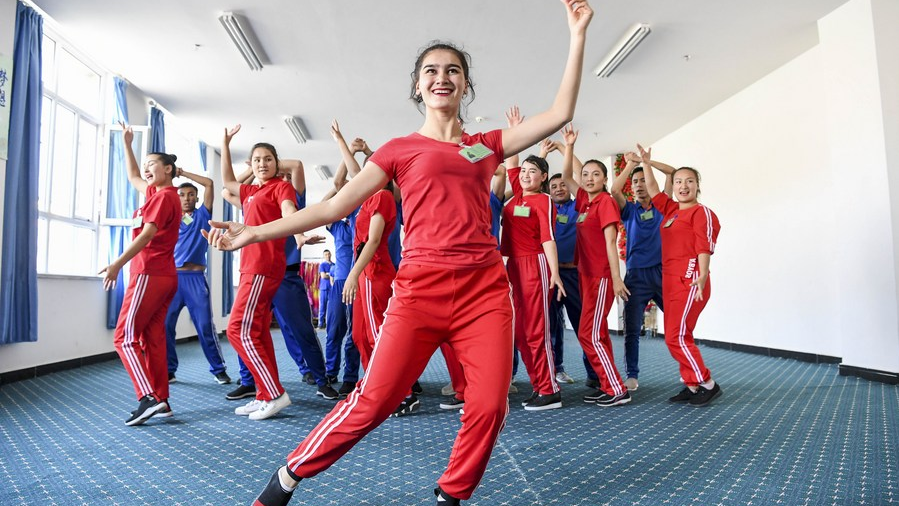
Trainees dance in spare time at the vocational education and training center in Hotan county of Hotan Prefecture, northwest China's Xinjiang Uygur Autonomous Region, October 7, 2018. /Xinhua
Trainees dance in spare time at the vocational education and training center in Hotan county of Hotan Prefecture, northwest China's Xinjiang Uygur Autonomous Region, October 7, 2018. /Xinhua
Editor's note: Shi Peipei is an assistant researcher with the Institute of America Studies at the Chinese Academy of Social Sciences. The article reflects the author's opinions and not necessarily the views of CGTN.
On August 31, just minutes before her term ended, UN High Commissioner for Human Rights Michelle Bachelet released her "OHCHR Assessment of human rights concerns in the Xinjiang Uyghur Autonomous Region, People's Republic of China" report under the seal of the UN Office of the High Commissioner for Human Rights, stating that the Chinese government's actions in Xinjiang may constitute "crimes against humanity."
This is totally inconsistent with the facts. In May 2022, at the end of her visit to Xinjiang, Bachelet spoke highly of the human rights situation in the region and praised China for eliminating extreme poverty, with an objective and rational attitude that made the world aware of a real China, and a Xinjiang that has not been misrepresented.
But just one month after her statement, Bachelet suddenly changed her mind and backpedaled on her previous statement, saying that there were "limitations" on her visit to Xinjiang. The reason was that her visit and the statement she made afterwards were attacked by U.S.-led Western countries. Under Western pressure, Bachelet announced on June 13 that she would not seek re-election as UN High Commissioner for Human Rights. Likewise, it was under pressure from the U.S., UK and other Western countries that Bachelet, at the last minute of her term, released an assessment report on human rights issues in Xinjiang under the dominant discourse of Western countries.
The report is based on a presumption of guilt and a patchwork of "facts" about the Chinese government's "crimes against humanity" in Xinjiang. The report accuses the Chinese government of social governance and security control in Xinjiang, but ignores the long-term stability in the region in recent years; it accuses the government of efforts to eliminate extremism, but deliberately ignores the indiscriminate killings by rioters in the region. The report says vocational education and training centers have violated human rights, but does not mention that local ethnic minority people have been provided with government-sponsored education to escape poverty and become self-reliant.
In terms of the report's content, although there are many citations of Chinese laws and policies in the notes to demonstrate the report's "impartiality and objectivity," its core content and data material is based primarily on citations of studies from Western research institutions and non-governmental organizations, and a closer look at the reports issued by these institutions reveals their serious bias and lack of credibility.
Take for example the Australian Strategic Policy Institute, a leading institution conducting forced labor research. The institute's report on forced labor in Xinjiang is largely based on the statistics provided by Adrian Zenz, a far-right fundamentalist Christian whose questionable, incendiary accusations against China have led to the Western press branding him as a "leading expert" on Xinjiang. His estimate of "1.06 million detainees" have been cited by several Western think tanks and media outlets, but according to the independent U.S. investigative journalism website The Grayzone, this figure is a rough estimate just based on interviews with eight people by an anti-China group. This inaccurate information, which is manipulated and used out of context, eventually became "ironclad" evidence of China's "crimes against humanity."

A child enjoys ice cream at the International Grand Bazaar in Urumqi, capital of northwest China's Xinjiang Uygur Autonomous Region, July 17, 2019. /Xinhua
A child enjoys ice cream at the International Grand Bazaar in Urumqi, capital of northwest China's Xinjiang Uygur Autonomous Region, July 17, 2019. /Xinhua
Most of the time in history, Western countries have been racist in their approach to ethnic issues. In contrast, Chinese civilization is relatively inclusive since all 56 ethnic groups in the nation, including the Uygurs, enjoy equal rights under the law. Xinjiang's social stability, economic development, cultural prosperity, and religious harmony is the best response to Western stigmatization.
The lack of understanding of China, coupled with the long-lasting demonizing propaganda in the Western media, has led Western society to deliberately project the impression that "China is an authoritarian state ruled by ultra-left centralized politics." The U.S. has used this advantage to fabricate false public opinion about "human rights abuses" and "forced labor" in Xinjiang. The U.S. seeks to mobilize Western allies to jointly exert pressure on China, thereby achieving the goal of suppressing dominant industries in Xinjiang and increasing U.S. domestic industry competitiveness.
(If you want to contribute and have specific expertise, please contact us at opinions@cgtn.com. Follow @thouse_opinions on Twitter to discover the latest commentaries on CGTN Opinion Section.)

